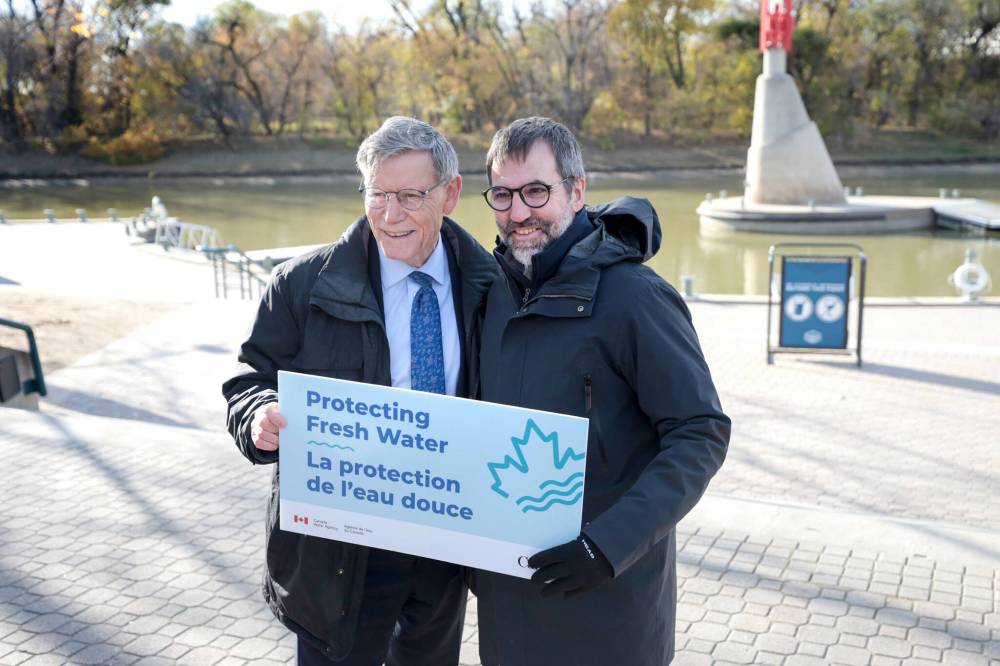Home to more than 100,000 lakes, rivers, creeks and streams, and more than 200,000 square kilometres of wetland, Manitoba is no stranger to water — now it will put that expertise to use as the hub for Canada’s water policy, research and funding initiatives.
On Wednesday, at the meeting place of the Red and Assiniboine rivers, federal Environment and Climate Change Minister Steven Guilbeault joined provincial and municipal leaders to launch the Canada Water Agency, which will co-ordinate funding and programming to manage the country’s freshwater resources.
“The agency will help the government of Canada better address current water challenges and those of the future,” Guilbeault told the crowd gathered at The Forks in downtown Winnipeg. “We need to be prepared for what comes in the future. We need to recognize that water is becoming more scarce and more precious. We have a responsibility to protect the waters we have.”

Ruth Bonneville / Free Press
Steven Guilbeault, Minister of Environment and Climate Change, right, with Winnipeg MP Terry Duguid at the Launch of Canada Water Agency at The Forks, Wednesday.
The federal Liberal government announced its intention to form a national water management organization in 2019. In 2023, the government announced the agency would be headquartered in Winnipeg and supported by an $85.1-million investment over five years. Legislation passed in June to allow the agency to operate independently of the government.
On Wednesday, Guilbeault noted the agency is being launched just as climate change has intensified the challenges facing Canada’s abundant freshwater resources.
“Droughts, floods, deteriorating water quality, pollution from farming and industrial activities have significant impacts on water quality — impacts that are very serious and costly,” he said, adding severe weather caused $7 billion in insured losses this summer, shattering weather damage records.
The agency will guide water policy and administer funding to programs that protect, rehabilitate and respond to emerging issues in eight major watersheds: Lake Winnipeg, Lake of the Woods, the Great Lakes, Lake Simcoe, and the Mackenzie, Fraser, Saint John and St. Lawrence rivers. The 2023 federal budget earmarked $650 million over 10 years for such freshwater ecosystem initiatives.
Daniel Wolfish, the interim president of the Canada Water Agency, said the organization began as a branch of the environment department last year and started work to enact the national freshwater action plan. To date, it has disbursed more than $90 million to projects that strengthen freshwater management, including investments to rehabilitate contaminated sites such as Lake Ontario’s Randle Reef, and efforts to address nutrient pollution.
Winnipeg MP Terry Duguid, the parliamentary secretary to the prime minister and special adviser on water, said reducing nutrient pollution and cleaning up contaminated waterways will be among the agency’s primary focus.
“(The focus) is to address the kinds of issues that Lake Winnipeg is facing: too many nutrients that make their way into our waterways and into our lakes causing algae blooms, affecting fisheries, affecting tourism, affecting our economy and people’s way of life,” he said.
Addressing those challenges requires co-ordination among federal, provincial, local, Indigenous and international governments, he noted.
Lake Winnipeg’s watershed, for example, starts in the Rocky Mountains to the west, crosses the border into Ontario, and touches four U.S. states.
Duguid said Canada’s water management has been “very fragmented,” but the new agency will focus on better co-ordination between departments and levels of government. Its priorities include reviewing and modernizing the 1970 Canada Water Act and establishing a national freshwater data strategy.
“We need to share data and work collaboratively in order to manage our watershed with the best science,” Duguid said. “What happens upstream ends up downstream.”
The agency will prioritize partnerships with Indigenous governments, and will work towards co-ordinating work by government bodies on issues such as access to clean water in First Nations.
“First Nations, Inuit and Métis have a special relationship with water because Indigenous people understand that water is the lifeblood of our bodies, water is the lifeblood of our economy, and water is the lifeblood of our country,” said Winnipeg MP Dan Vandal, the northern affairs minister.
The agency headquarters is located in downtown Winnipeg, adjacent to the offices of Environment Canada and the Meteorological Service of Canada. The downtown office will also host a regional arm of the water agency. Wolfish said the agency will open five other regional offices in Quebec, Ontario and British Columbia and will employ more than 200 staff, about half of whom will be based in Winnipeg.
“Water has always been central to Winnipeg’s identity,” Mayor Scott Gillingham said. “The rivers have shaped our history and no doubt they are shaping our future as well.”
julia-simone.rutgers@freepress.mb.ca

Julia-Simone Rutgers
Reporter
Julia-Simone Rutgers is the Manitoba environment reporter for the Free Press and The Narwhal. She joined the Free Press in 2020, after completing a journalism degree at the University of King’s College in Halifax, and took on the environment beat in 2022. Read more about Julia-Simone.
Julia-Simone’s role is part of a partnership with The Narwhal, funded by the Winnipeg Foundation. Every piece of reporting Julia-Simone produces is reviewed by an editing team before it is posted online or published in print — part of the Free Press‘s tradition, since 1872, of producing reliable independent journalism. Read more about Free Press’s history and mandate, and learn how our newsroom operates.
Our newsroom depends on a growing audience of readers to power our journalism. If you are not a paid reader, please consider becoming a subscriber.
Our newsroom depends on its audience of readers to power our journalism. Thank you for your support.